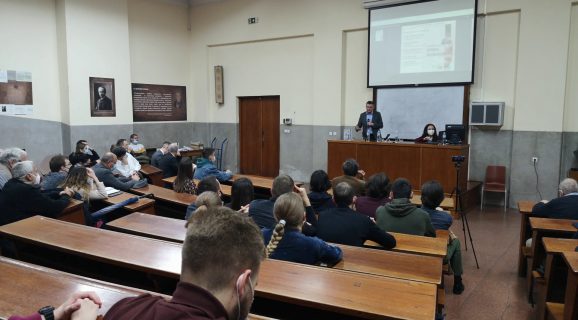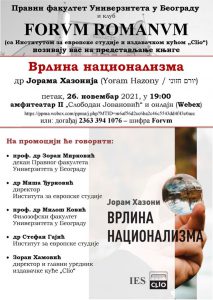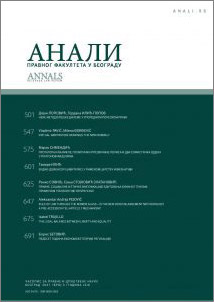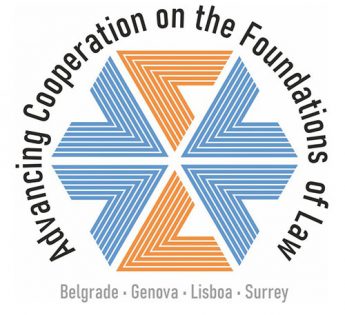
Forvm Romanvm: Presenting the Serbian Edition of “The Virtue of Nationalism” by Yoram Hazony
 On Friday, the 26th of November 2021, the Forvm Romanvm club met in the flesh – or, rather, in a hybrid format – for the first time since the pandemic began. The event that prompted this gathering both online and in person (while adhering to all the necessary measures) was the promotion of the Serbian edition of Yoram Hazony’s book “The Virtue of Nationalism”, recently published in a joint endeavour of the Institute for European Studies and “Clio” Publishing. Speaking at the event were Prof. Dr Zoran Mirković, the Dean of the University of Belgrade Faculty of Law, Prof. Dr Miloš Ković of the University of Belgrade Faculty of Philosophy, Dr Stefan Gajić of the Institute for European Studies, and Dr Miša Đurković, the director of the Institute. The fifth speaker, Zoran Hamović, director and chief editor of “Clio” Publishing, was, sadly, unable to attend due to health issues. Each of the speakers presented the book from their own point of view, pointing out the values of Hazony’s view of nationalism as a positive force, opposing imperialism. According to Hazony, nationalism is at the base of the idea of free national states, which has its roots in the Bible – in practice, it was honoured starting with the Westphalia Treaty (1648), and up until the second half of the 20th century, when, under the excuse that the horrors of World War II must never be repeated (while ignoring the fact that the ambitions of Hitler’s Germany were nothing if not imperialistic), a mass campaign against nationalism was pushed forward, along with a promotion of the supranational – and basically imperialistic – order presented by the USA and the EU. The speakers pointed out how valuable this view was when looking both at the larger picture, and at Serbia, more specifically. Still, there was some criticism directed at Hazony’s work as well; first and foremost, that it focused too heavily on the Western world, without offering an overview of the history and ideology of Slavic countries, which would certainly have provided numerous facts to support the author’s theory, while also bringing up some specific features. After the promotion, a lively and active discussion ensued, in which both those who were present in person and those following the event online participated with equal interest.
On Friday, the 26th of November 2021, the Forvm Romanvm club met in the flesh – or, rather, in a hybrid format – for the first time since the pandemic began. The event that prompted this gathering both online and in person (while adhering to all the necessary measures) was the promotion of the Serbian edition of Yoram Hazony’s book “The Virtue of Nationalism”, recently published in a joint endeavour of the Institute for European Studies and “Clio” Publishing. Speaking at the event were Prof. Dr Zoran Mirković, the Dean of the University of Belgrade Faculty of Law, Prof. Dr Miloš Ković of the University of Belgrade Faculty of Philosophy, Dr Stefan Gajić of the Institute for European Studies, and Dr Miša Đurković, the director of the Institute. The fifth speaker, Zoran Hamović, director and chief editor of “Clio” Publishing, was, sadly, unable to attend due to health issues. Each of the speakers presented the book from their own point of view, pointing out the values of Hazony’s view of nationalism as a positive force, opposing imperialism. According to Hazony, nationalism is at the base of the idea of free national states, which has its roots in the Bible – in practice, it was honoured starting with the Westphalia Treaty (1648), and up until the second half of the 20th century, when, under the excuse that the horrors of World War II must never be repeated (while ignoring the fact that the ambitions of Hitler’s Germany were nothing if not imperialistic), a mass campaign against nationalism was pushed forward, along with a promotion of the supranational – and basically imperialistic – order presented by the USA and the EU. The speakers pointed out how valuable this view was when looking both at the larger picture, and at Serbia, more specifically. Still, there was some criticism directed at Hazony’s work as well; first and foremost, that it focused too heavily on the Western world, without offering an overview of the history and ideology of Slavic countries, which would certainly have provided numerous facts to support the author’s theory, while also bringing up some specific features. After the promotion, a lively and active discussion ensued, in which both those who were present in person and those following the event online participated with equal interest.




